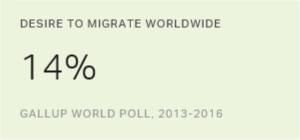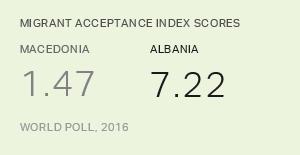Story Highlights
- Desire to migrate in Northern America up for the first time
- U.S. still No. 1 desired destination for potential migrants
- 18 countries attract two-thirds of all potential migrants worldwide
WASHINGTON, D.C. -- After the migrant crisis swept Europe in 2015, migration emerged as a dominant, divisive issue not only in European politics, where anti-migrant parties gained power, but also in politics elsewhere around the world. This includes the U.S., where President Donald Trump's demand for funding for a border wall with Mexico could lead to a partial government shutdown yet this year.
Instead of any of this acting as a deterrent, Gallup World Poll surveys find people's desire to migrate permanently to another country actually increased between 2015 and 2017. Gallup's surveys throughout this period found 15% of the world's adults -- or more than 750 million people -- saying they would like to move to another country if they had the opportunity. This is up from 14% between 2013 and 2016 and 13% between 2010 and 2012, but still lower than the 16% between 2007 and 2009.
| 2010-2012 | 2013-2016 | 2015-2017 | |||||||||||||||||||||||||||||||||||||||||||||||||||||||||||||||||||||||||||||||||||||||||||||||||
|---|---|---|---|---|---|---|---|---|---|---|---|---|---|---|---|---|---|---|---|---|---|---|---|---|---|---|---|---|---|---|---|---|---|---|---|---|---|---|---|---|---|---|---|---|---|---|---|---|---|---|---|---|---|---|---|---|---|---|---|---|---|---|---|---|---|---|---|---|---|---|---|---|---|---|---|---|---|---|---|---|---|---|---|---|---|---|---|---|---|---|---|---|---|---|---|---|---|---|---|
| % | % | % | |||||||||||||||||||||||||||||||||||||||||||||||||||||||||||||||||||||||||||||||||||||||||||||||||
| Sub-Saharan Africa | 30 | 31 | 33 | ||||||||||||||||||||||||||||||||||||||||||||||||||||||||||||||||||||||||||||||||||||||||||||||||
| Latin America and Caribbean | 18 | 23 | 27 | ||||||||||||||||||||||||||||||||||||||||||||||||||||||||||||||||||||||||||||||||||||||||||||||||
| Europe (non-European Union) | 21 | 27 | 26 | ||||||||||||||||||||||||||||||||||||||||||||||||||||||||||||||||||||||||||||||||||||||||||||||||
| Middle East and North Africa | 19 | 22 | 24 | ||||||||||||||||||||||||||||||||||||||||||||||||||||||||||||||||||||||||||||||||||||||||||||||||
| European Union | 20 | 21 | 21 | ||||||||||||||||||||||||||||||||||||||||||||||||||||||||||||||||||||||||||||||||||||||||||||||||
| Commonwealth of Independent States | 15 | 14 | 15 | ||||||||||||||||||||||||||||||||||||||||||||||||||||||||||||||||||||||||||||||||||||||||||||||||
| Northern America | 10 | 10 | 14 | ||||||||||||||||||||||||||||||||||||||||||||||||||||||||||||||||||||||||||||||||||||||||||||||||
| Australia/New Zealand/Oceania | 9 | 10 | 9 | ||||||||||||||||||||||||||||||||||||||||||||||||||||||||||||||||||||||||||||||||||||||||||||||||
| East Asia | 8 | 7 | 8 | ||||||||||||||||||||||||||||||||||||||||||||||||||||||||||||||||||||||||||||||||||||||||||||||||
| South Asia | 8 | 8 | 8 | ||||||||||||||||||||||||||||||||||||||||||||||||||||||||||||||||||||||||||||||||||||||||||||||||
| Southeast Asia | 7 | 7 | 7 | ||||||||||||||||||||||||||||||||||||||||||||||||||||||||||||||||||||||||||||||||||||||||||||||||
| World | 13 | 14 | 15 | ||||||||||||||||||||||||||||||||||||||||||||||||||||||||||||||||||||||||||||||||||||||||||||||||
| Note: Figures represent percentage who would like to move if they could | |||||||||||||||||||||||||||||||||||||||||||||||||||||||||||||||||||||||||||||||||||||||||||||||||||
| Gallup World Poll | |||||||||||||||||||||||||||||||||||||||||||||||||||||||||||||||||||||||||||||||||||||||||||||||||||
See how your country would change if everyone moved where they wanted, and find out more about how Gallup arrives at these estimates, by visiting the Migration Research Center.
Gallup's latest update on adults' desire to move to another country is based on a rolling average of interviews with 453,122 adults in 152 countries and areas between 2015 and 2017. This analysis period coincided with the migrant crisis that started in Europe in 2015, in which tens of thousands of migrants and refugees have since died trying to reach the continent.
In addition to the political backlash against this wave, the analysis period also overlapped with the subsequent development of the legally nonbinding agreement that many U.N. member states are expected to formally adopt this week that sets objectives to make migration "safe, orderly and regular."
Desire Up in Sub-Saharan Africa, Latin America, Middle East and Northern America
While shy of the record-high 16%, the desire to migrate has rebounded since the years after the Great Recession, as conflict, famine and disaster continue to drive people from their homes in some parts of the world. Desire increased most between the 2010-2012 and 2015-2017 periods in a number of regions already known for sending migrants, such as sub-Saharan Africa, Latin America and the Caribbean, and the Middle East and North Africa.
But desire is also up significantly in Northern America, where 14% want to migrate after years of remaining flat near 10%. This is almost entirely driven by increases in the U.S. in 2016 and 2017. The one in six Americans (16%) in 2017 who said they would like to move to another country is the highest measure to date.
Yet in other places, desire to migrate has not changed much at all for years. In all regions of Asia, for example, the percentage of adults who would like to move to another country permanently has remained flat. In Europe, while desire to migrate has increased among residents of non-EU member states (which includes the Balkans), desire has remained flat among EU member states overall.
In 13 countries, at least half of the adult population would like to move to another country if they had the chance. These countries represent nearly every region of the world -- except for Northern America and Asia -- and most of them were going through or are still going through some sort of upheaval. Sierra Leone and Liberia, for example, were still in the grips of an Ebola outbreak when Gallup surveyed residents in those countries.
| Desire to migrate | |||||||||||||||||||||||||||||||||||||||||||||||||||||||||||||||||||||||||||||||||||||||||||||||||||
|---|---|---|---|---|---|---|---|---|---|---|---|---|---|---|---|---|---|---|---|---|---|---|---|---|---|---|---|---|---|---|---|---|---|---|---|---|---|---|---|---|---|---|---|---|---|---|---|---|---|---|---|---|---|---|---|---|---|---|---|---|---|---|---|---|---|---|---|---|---|---|---|---|---|---|---|---|---|---|---|---|---|---|---|---|---|---|---|---|---|---|---|---|---|---|---|---|---|---|---|
| % | |||||||||||||||||||||||||||||||||||||||||||||||||||||||||||||||||||||||||||||||||||||||||||||||||||
| Sierra Leone | 71 | ||||||||||||||||||||||||||||||||||||||||||||||||||||||||||||||||||||||||||||||||||||||||||||||||||
| Liberia | 66 | ||||||||||||||||||||||||||||||||||||||||||||||||||||||||||||||||||||||||||||||||||||||||||||||||||
| Haiti | 63 | ||||||||||||||||||||||||||||||||||||||||||||||||||||||||||||||||||||||||||||||||||||||||||||||||||
| Albania | 60 | ||||||||||||||||||||||||||||||||||||||||||||||||||||||||||||||||||||||||||||||||||||||||||||||||||
| El Salvador | 52 | ||||||||||||||||||||||||||||||||||||||||||||||||||||||||||||||||||||||||||||||||||||||||||||||||||
| Congo (Kinshasa) | 50 | ||||||||||||||||||||||||||||||||||||||||||||||||||||||||||||||||||||||||||||||||||||||||||||||||||
| Ghana | 49 | ||||||||||||||||||||||||||||||||||||||||||||||||||||||||||||||||||||||||||||||||||||||||||||||||||
| Dominican Republic | 49 | ||||||||||||||||||||||||||||||||||||||||||||||||||||||||||||||||||||||||||||||||||||||||||||||||||
| Nigeria | 48 | ||||||||||||||||||||||||||||||||||||||||||||||||||||||||||||||||||||||||||||||||||||||||||||||||||
| Armenia | 47 | ||||||||||||||||||||||||||||||||||||||||||||||||||||||||||||||||||||||||||||||||||||||||||||||||||
| Honduras | 47 | ||||||||||||||||||||||||||||||||||||||||||||||||||||||||||||||||||||||||||||||||||||||||||||||||||
| Syria | 46 | ||||||||||||||||||||||||||||||||||||||||||||||||||||||||||||||||||||||||||||||||||||||||||||||||||
| Kosovo | 46 | ||||||||||||||||||||||||||||||||||||||||||||||||||||||||||||||||||||||||||||||||||||||||||||||||||
| Gallup World Poll, 2015-2017 | |||||||||||||||||||||||||||||||||||||||||||||||||||||||||||||||||||||||||||||||||||||||||||||||||||
U.S. Still Top Desired Destination for Potential Migrants
The countries where potential migrants say they would like to move -- if they could -- have generally been the same for the past 10 years. In fact, roughly 18 countries attract two-thirds of all potential migrants worldwide.
Although the image of U.S. leadership took a beating between 2016 and 2017, the U.S. continues to be the most desired destination country for potential migrants, as it has since Gallup started tracking these patterns a decade ago.
One in five potential migrants (21%) -- or about 158 million adults worldwide -- name the U.S. as their desired future residence. Canada, Germany, France, Australia and the United Kingdom each appeal to more than 30 million adults.
| 2010-2012 | 2015-2017 | Estimated number of adults | |||||||||||||||||||||||||||||||||||||||||||||||||||||||||||||||||||||||||||||||||||||||||||||||||
|---|---|---|---|---|---|---|---|---|---|---|---|---|---|---|---|---|---|---|---|---|---|---|---|---|---|---|---|---|---|---|---|---|---|---|---|---|---|---|---|---|---|---|---|---|---|---|---|---|---|---|---|---|---|---|---|---|---|---|---|---|---|---|---|---|---|---|---|---|---|---|---|---|---|---|---|---|---|---|---|---|---|---|---|---|---|---|---|---|---|---|---|---|---|---|---|---|---|---|---|
| % | % | (in millions) | |||||||||||||||||||||||||||||||||||||||||||||||||||||||||||||||||||||||||||||||||||||||||||||||||
| United States | 22 | 21 | 158 | ||||||||||||||||||||||||||||||||||||||||||||||||||||||||||||||||||||||||||||||||||||||||||||||||
| Canada | 6 | 6 | 47 | ||||||||||||||||||||||||||||||||||||||||||||||||||||||||||||||||||||||||||||||||||||||||||||||||
| Germany | 4 | 6 | 42 | ||||||||||||||||||||||||||||||||||||||||||||||||||||||||||||||||||||||||||||||||||||||||||||||||
| France | 5 | 5 | 36 | ||||||||||||||||||||||||||||||||||||||||||||||||||||||||||||||||||||||||||||||||||||||||||||||||
| Australia | 4 | 5 | 36 | ||||||||||||||||||||||||||||||||||||||||||||||||||||||||||||||||||||||||||||||||||||||||||||||||
| United Kingdom | 7 | 4 | 34 | ||||||||||||||||||||||||||||||||||||||||||||||||||||||||||||||||||||||||||||||||||||||||||||||||
| Saudi Arabia | 5 | 3 | 24 | ||||||||||||||||||||||||||||||||||||||||||||||||||||||||||||||||||||||||||||||||||||||||||||||||
| Spain | 4 | 3 | 21 | ||||||||||||||||||||||||||||||||||||||||||||||||||||||||||||||||||||||||||||||||||||||||||||||||
| Japan | 2 | 2 | 17 | ||||||||||||||||||||||||||||||||||||||||||||||||||||||||||||||||||||||||||||||||||||||||||||||||
| Italy | 3 | 2 | 15 | ||||||||||||||||||||||||||||||||||||||||||||||||||||||||||||||||||||||||||||||||||||||||||||||||
| Switzerland | 2 | 2 | 14 | ||||||||||||||||||||||||||||||||||||||||||||||||||||||||||||||||||||||||||||||||||||||||||||||||
| United Arab Emirates | 2 | 2 | 12 | ||||||||||||||||||||||||||||||||||||||||||||||||||||||||||||||||||||||||||||||||||||||||||||||||
| Singapore | 1 | 1 | 11 | ||||||||||||||||||||||||||||||||||||||||||||||||||||||||||||||||||||||||||||||||||||||||||||||||
| Sweden | 1 | 1 | 9 | ||||||||||||||||||||||||||||||||||||||||||||||||||||||||||||||||||||||||||||||||||||||||||||||||
| China | 1 | 1 | 9 | ||||||||||||||||||||||||||||||||||||||||||||||||||||||||||||||||||||||||||||||||||||||||||||||||
| New Zealand | 1 | 1 | 9 | ||||||||||||||||||||||||||||||||||||||||||||||||||||||||||||||||||||||||||||||||||||||||||||||||
| Russia | 1 | 1 | 8 | ||||||||||||||||||||||||||||||||||||||||||||||||||||||||||||||||||||||||||||||||||||||||||||||||
| Netherlands | 1 | 1 | 7 | ||||||||||||||||||||||||||||||||||||||||||||||||||||||||||||||||||||||||||||||||||||||||||||||||
| South Africa | 1 | 1 | 7 | ||||||||||||||||||||||||||||||||||||||||||||||||||||||||||||||||||||||||||||||||||||||||||||||||
| Brazil | 1 | 1 | 6 | ||||||||||||||||||||||||||||||||||||||||||||||||||||||||||||||||||||||||||||||||||||||||||||||||
| South Korea | 1 | 1 | 6 | ||||||||||||||||||||||||||||||||||||||||||||||||||||||||||||||||||||||||||||||||||||||||||||||||
| Turkey | * | 1 | 6 | ||||||||||||||||||||||||||||||||||||||||||||||||||||||||||||||||||||||||||||||||||||||||||||||||
| *Less than 0.5% | |||||||||||||||||||||||||||||||||||||||||||||||||||||||||||||||||||||||||||||||||||||||||||||||||||
| Gallup World Poll, 2015-2017 | |||||||||||||||||||||||||||||||||||||||||||||||||||||||||||||||||||||||||||||||||||||||||||||||||||
Implications
While this increase in the desire to migrate may set off alarms among those who would like to see fewer people on the move, Gallup typically finds that the percentage of those who have plans to move is much lower than the percentage who would like to move. Those smaller Gallup figures actually track quite well with the U.N.'s data on migrant flows.
Still, while these dreams will only come true for some people who desire to migrate, who these potential migrants are, where they'd like to leave and where they'd like to go all provide important information for leaders about who they might lose and who they are attracting. And the actions that many U.N. member states take in Morocco this week could help ensure that the journey will be safe, orderly and regular -- if people do decide to move.
For complete methodology and specific survey dates, please review Gallup's Country Data Set details.
Learn more about how the Gallup World Poll works.




